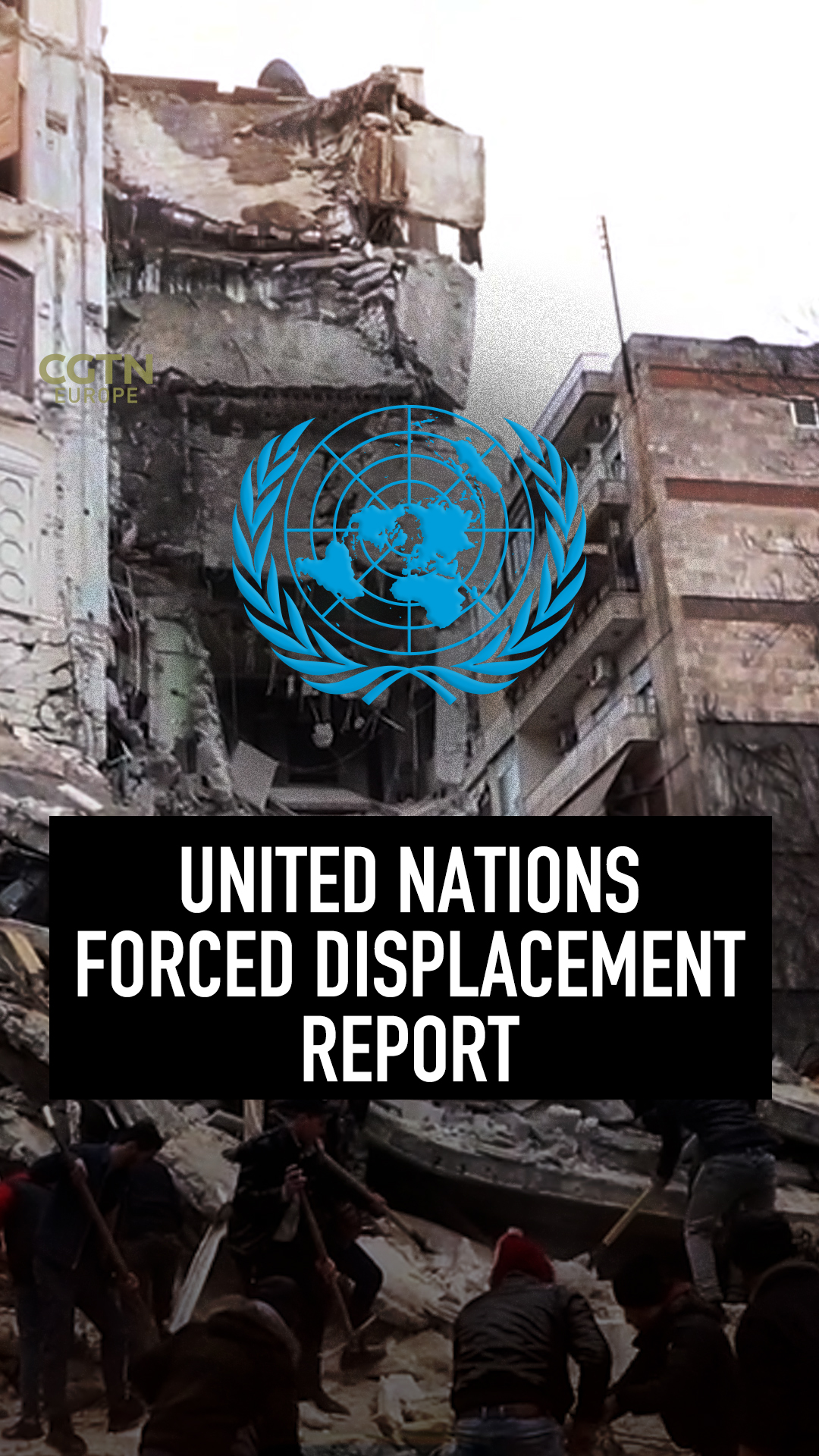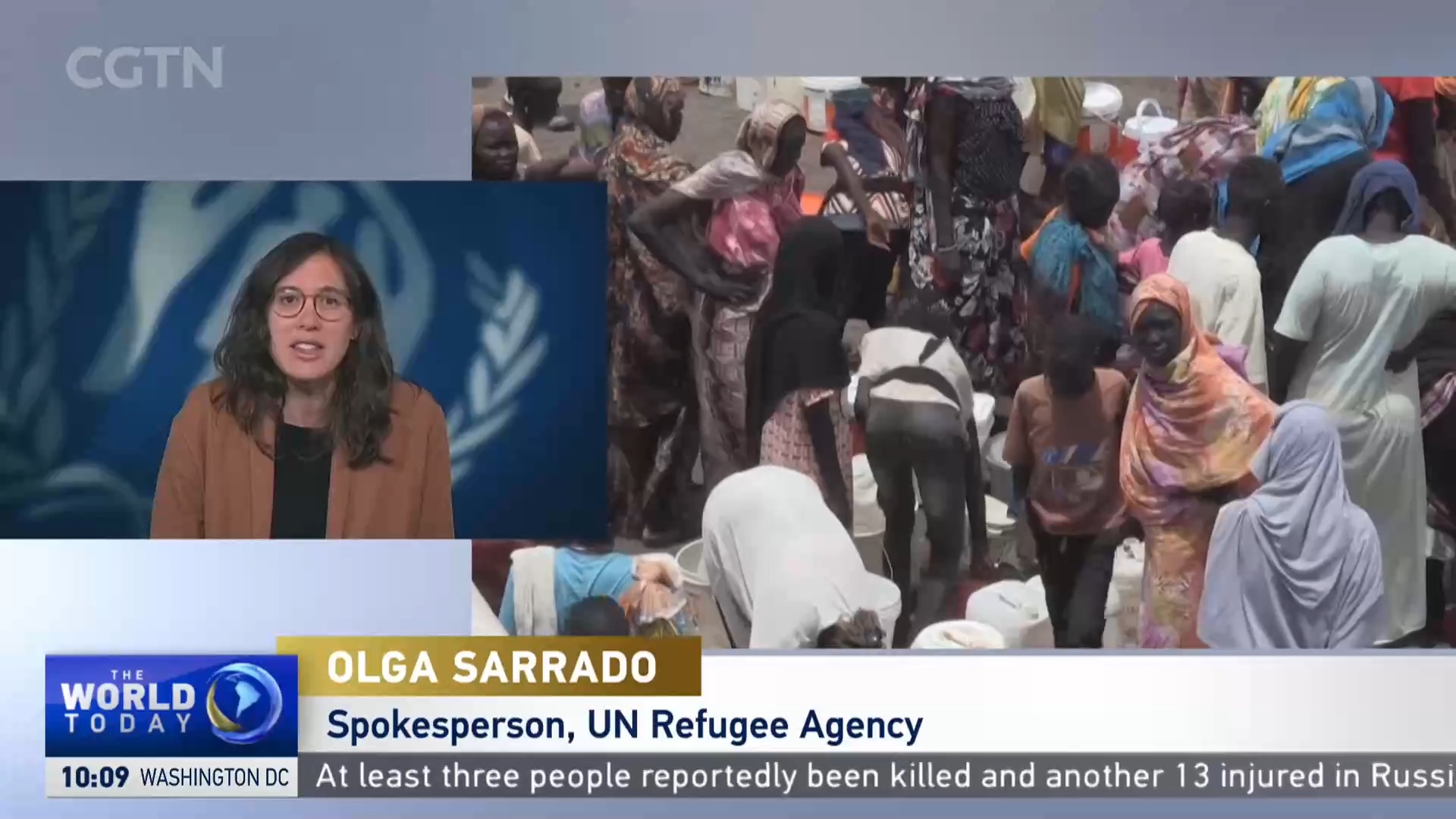01:14

A record high number of 108.4 million displaced people worldwide has been announced by the UN's Refugee Agency (UNHCR). It's a rise of more than 20 percent in a year.
The UNHCR's annual report - Global Trends in Forced Displacement 2022 - says the increase of 19.1 million more people fleeing their homes last year was caused mainly by the conflicts in Ukraine, Sudan and Syria, along with climate-driven upheaval.
Appearing on CGTN Europe, UNHCR spokesperson Olga Sarrado Mur criticized the world's richest countries for dragging their heels in meeting their international obligations to accept refugees.
Some wealthy countries have been attacked for seeking to 'outsource' their obligations. For instance, the UK is attempting to get a deal off the ground in which Rwanda is paid to accept asylum-seekers who have arrived in Britain using illegal methods. Last week the EU said it would give Tunisia more than €1 billion ($1.08 USD) of aid in return for better border control and measures against human smuggling.
03:08

Sarrado Mur told CGTN Europe: "We see with concern some of these practices of externalizing the obligation that countries have to protect those people that are fleeing wars and conflict and persecution; also returns (and) pushbacks that are forcing people to take dangerous journeys to reach safety."
An observation that comes on the same day dozens of refugees have died off the Greek coast when their boat capsized with hundreds believed missing in the water. The report's authors demand urgent and immediate collective action to reverse the trend.
READ MORE
Dozens dead in migrant shipwreck off Greece
iphone connector change not enough to stop e-waste
McCartney uses AI to create 'final' Beatles record
The UNHCR said it believes the escalation of the Sudan conflict means the number of displaced people has now surpassed 110 million.
Appearing on CGTN, Mur said "we see another record number, 110 million people forcibly displaced worldwide; that is 110 million lives shattered. This is one in 74 people in the world that have been forced to leave their homes seeking safety and just to save their lives."
UN High Commissioner for Refugees Filippo Grandi added: "These figures show us that some people are far too quick to rush to conflict, and way too slow to find solutions. The consequence is devastation, displacement, and anguish for each of the millions of people forcibly uprooted from their homes."

Displaced people in transit in the Democratic Republic of Congo. /Hélène Caux/UNHCR
Displaced people in transit in the Democratic Republic of Congo. /Hélène Caux/UNHCR
Staggering
Of the global total of displaced people, 35.3 million were refugees, classified as those who crossed an international border to find safety. A further 62.5 million people were displaced within their home countries due to conflict and violence.
A staggering 52 percent of refugees originated from just three countries - Syria (6.5 million), Ukraine (5.7 million) and Afghanistan (5.7 million).
The report states that the war in Ukraine, which began in February 2022, was the top driver of displacement last year, marking "the fastest outflow of refugees anywhere since World War II."
There were also sharp rises in the number of refugees from Afghanistan, while revised estimates by Colombia and Peru of the numbers of Venezuelans needing international protection pushed the figures even higher.
In one stark statistic, children accounted for 40 percent of all forcibly displaced people, despite only making up around 30 percent of the world's population.
A total of 32.6 million new displacements occurred due to disasters. The report stated that "21 percent occurring (occurred) in the Least Developed Countries and Small Island Developing States, countries that have experienced disproportionately high economic losses in relation to the size of their economies as a result of disasters and climate change."
Mur believes the combination of warzones and climate change is driving people out of their homes at record speed.

An overcrowded refugee camp one in Baidoa, in Somalia's South West State.
/Nabil Narch/UNHCR
An overcrowded refugee camp one in Baidoa, in Somalia's South West State.
/Nabil Narch/UNHCR
Burden not shared
The U.S. received 730,400 applications from displaced persons, the largest number worldwide, followed by Germany, Costa Rica, and Spain.
However, the figures also showed that the world's low and middle-income countries hosted a disproportionate number of the displaced. The report stated: "The 46 least developed countries account for less than 1.3 percent of global gross domestic product, yet they hosted more than 20 percent of all refugees."
Grandi called for a more equitable global response. "People around the world continue to show extraordinary hospitality for refugees as they extend protection and help to those in need," he insisted. "But much more international support and more equitable responsibility sharing is required, especially with those countries that are hosting most of the world's displaced.
There were an estimated 4.4 million people worldwide left stateless or of undetermined nationality, a rise of 2 percent from 2021.
There was some good news, though. More than 339,000 refugees returned to 38 countries, with significant numbers noted in South Sudan, Syria, Cameroon and Ivory Coast. In addition, 5.7 million internally displaced people returned in 2022, notably within Ethiopia, Myanmar, Syria, Mozambique and the Democratic Republic of the Congo.
The Global Trends report was launched six months ahead of the UNHCR's second Global Refugee Forum. This Geneva gathering will see policymakers and interested parties seek new solutions to the refugee crisis.

Subscribe to Storyboard: A weekly newsletter bringing you the best of CGTN every Friday
Video editor: Butchy Davy